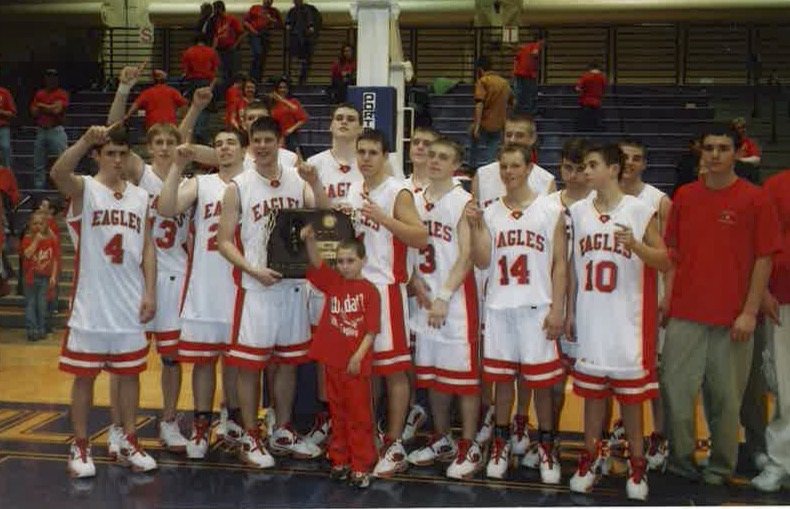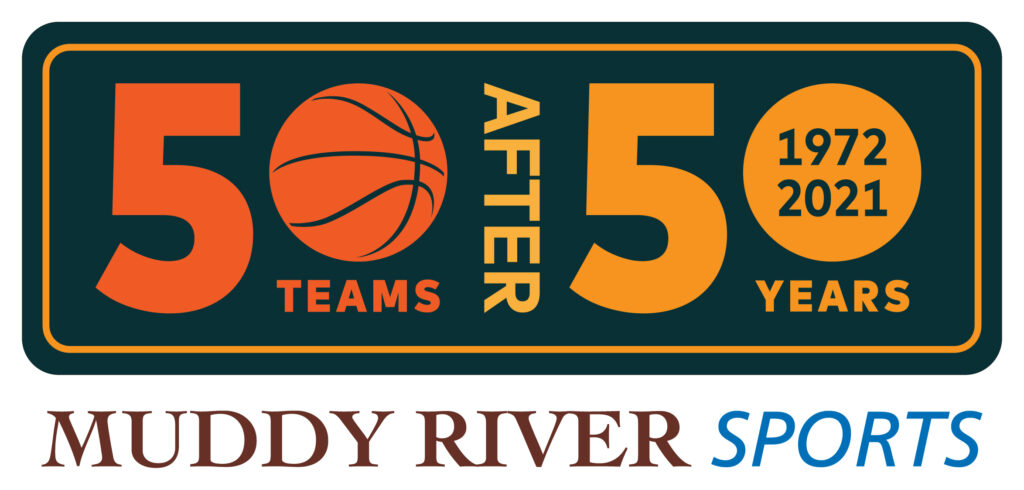50 After 50: No. 14 Eagles figured out how to soar with confidence when games got tight

The Illinois High School Association created a second class for boys basketball for the 1971-72 school year. The 2020-21 season would have been the 50th year of the boys basketball small-school tournament. Muddy River Sports is celebrating 50 years of small-school boys basketball by ranking the 50 best teams in Adams, Brown, Pike and Hancock counties since 1972.
No. 14 — 2004-05 Liberty
LIBERTY, Ill. — Jeff Kasparie had every intention of taking his 2005 Liberty boys basketball team to the Class A state tournament.
So he ordered tickets to ensure they’d have seats in Peoria. And sure enough, an envelope containing the tickets arrived at the school in the middle of the week while the Eagles were in the midst of their postseason run.
“I open the envelope at practice and I say, ‘Guys, not too bad. We’re only 41 rows off the floor,’” Kasparie said. “Gavin Huber turns and looks at me, and this is probably about sectional time, and he goes, ‘Coach, we’ll be sitting on the floor. Don’t you know that?’ Everybody chuckled, but he put his mind to it and he was going to get it done.”
Huber and the Eagles didn’t quit until they were sitting courtside at Carver Arena.
Forced to win in overtime in the regional and sectional championships and survive fourth-quarter rallies in the super-sectional and state quarterfinal, Liberty reached the final four for only the second time in program history when it brought home fourth place.
They finished 30-4, which ties them for the single-season school record for victories.
“Being able to hold our composure late in games allowed us to bond and trust each other,” Kasparie said.
That became the hallmark of this group weeks before the postseason began.
During a late-season practice, Kasparie split his players for 5-on-5 drills in such a way that senior point guard Joe Starnes and junior guard Ty Meyer were on opposite sides. Before any realized it, the two were butting heads.
“They physically get into it. Balls are being thrown and everything,” Kasparie said. “I clear the gym and put everybody on the sideline and I start in on them. I say, ‘Do you guys understand you have more talent on this team than some schools see in 10 years and you guys are willing to throw it down the drain?’
“You could hear a mouse fart in that gym. I laid into them for about 10 minutes, and we come back on the court and I see guys hugging each other, giving high-fives, saying ‘Let’s go. We’ve got this. We can do this.’ That was one of those turning points for me as a coach where I was like, ‘Oh, they get it.’”
It was probably the second most pivotal coaching moment of the season.
The first came after the Winchester Tournament in mid-January.
The Eagles, who had the right mix of a guard who played bigger than he was, a blossoming big man and experienced leadership throughout the lineup, rattled off 12 consecutive victories, including the championship of the MVIT during the Christmas break and beating Greenfield in the opening round at Winchester.
But after suffering back-to-back losses to North Greene and Brown County — both in overtime — Kasparie felt he needed to reassess some things.
“I’m not sure it was about how the guys reacted to those losses but how the coaching staff reacted,” Kasparie said. “Dating back to the Paul Kreke years, we tried to make sure we had two peaks to our season. We don’t have football at Liberty, so we knew coming out of the gate we were going to win some games because other schools had football.
“Then we wanted to make sure we made a good run after the Winchester Tournament. So the coaching staff was like, ‘Hey, let’s get through the Winchester Tournament and then we’ll really get after it. After the two losses, myself and (assistant coach) Mike Fessler really started getting after what we had to do as coaches to lead our team.
“We had to do more to get them where they needed to be.”
In some cases, it was getting players to buy into their roles.
Three starters averaged in double figures — Brock at 17.1 points per game, followed by Starnes at 13.5 and Huber at 12.1 — with Travis Knuffman averaging nine points per game. Andy Seals and Bryan Schullian had significant roles coming off the bench.
Others, like senior Richard Markey, were more significant behind the scenes.
That’s where Markey took on his role as a mugger.
“I told Richard right from the beginning your job is to beat the crap out of Justin Brock every day in practice and make him a man,” Kasparie said. “I told him if you do that, you’ll get just as much publicity from us as he does on the floor.”
Markey has the state medal to prove it.
The reason? This team never surrendered.
“Our kids did hold together and believed in each other,” Kasparie said.
Miss Clipping Out Stories to Save for Later?
Click the Purchase Story button below to order a print of this story. We will print it for you on matte photo paper to keep forever.

